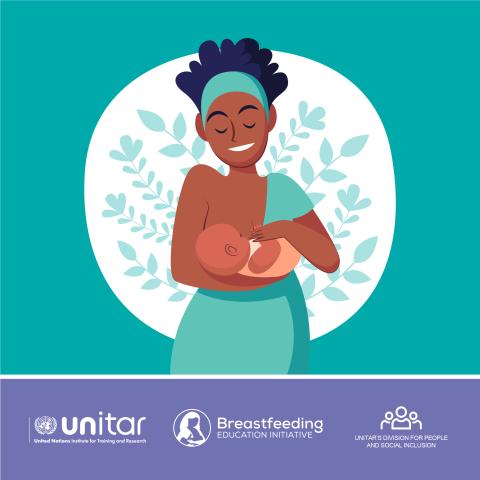
[ENGLISH] THE MAGIC DROP: Supporting mothers along the journey (1 hour)
This E-learning course developed by the United Nations Institute for Training and Research (UNITAR) comes as part of the Global Breastfeeding Education Initiative (BFEI).
UNITAR helps Member States and other United Nations stakeholders implement the 2030 Agenda for Sustainable Development by providing learning and knowledge services that meet internationally recognized quality standards.
As a practical step towards protecting the survival and health of babies and women, breastfeeding is a central part of the 2030 Agenda for Sustainable Development and is linked to many of the Sustainable Development Goals. Breastfeeding is, for example, a critical aspect in achieving SDG2 and SDG3 — which include ending hunger, improving nutrition, and promoting health and wellbeing.
Promoting breastfeeding practices such as initiation within one hour of birth and continuing for up to two years of age and beyond is essential for improving child health, preventing malnutrition, and reducing under 5 mortality.
Through this Initiative, UNITAR aims to contribute to facilitating breastfeeding by developing and providing a variety of educational tools that will target diverse audiences at policy, organizational, academic and community levels.
Creating facilitating environments for breastfeeding requires knowledge on the science behind breastfeeding and a critical understanding of social and cultural factors that affect breastfeeding.
Furthermore, the course aims at providing the practical tools for promoting and supporting breastfeeding to a wide audience including women, their partners, community, healthcare professionals and employers.
The content of the course stems from our belief that support needs to be provided to women on all levels starting from the smallest nucleus at home all the way up to policy makers.
Module 1 focuses on the level of an expecting mother preparing to initiate breastfeeding or a mother who has already started breastfeeding. It offers the latest scientific findings concerning the composition of breastmilk and the constant changes that occur to such composition to cater for the needs of the infant.
The module provides recommendations on the nutritional requirements in the mother’s diet preparing her before, during and after breastfeeding. It further develops on the benefits of breastfeeding to both mother and baby. An important aspect of this module is the demystification on some common beliefs surrounding breastfeeding.
Module 2 describes the concept of feeding on demand and the frequency of feeding. It tackles milk transfer and the signs of a proper latching compared to poor latching. Additionally, Module 2 equips participants with the findings on positive breastfeeding practices and their advantages. Finally, this module reaches the structural determinants and the role of cultural and familial influences on breastfeeding.
Module 3 tackles the challenges that women may face on their breastfeeding journey and provides input on how to deal with such challenges. It gives participants an active role in encouraging and facilitating breastfeeding through key communication skills. A dedicated section focuses on breastfeeding at work, the importance of a supportive workplace, examples of successful initiatives and the commitment needed from employers to improve towards creating a breastfeeding-friendly environment.
Module 1:
- Identify main components of breastmilk and its adaptability
- Describe the impact of breastmilk and breastfeeding on the health of mothers and infants
- Identify pre- and post-natal dietary and nutritional requirements for mothers
- Assess the veracity of common beliefs about breastfeeding
Module 2:
- Describe responsive feeding and its importance
- Assess milk transfer and proper latching
- Communicate recommended breastfeeding practices and their key advantages
- Identify cultural determinants to breastfeeding and assess the role of family legacy
Module 3:
- Determine key physical, psychological, and structural issues women face regarding breastfeeding
- Associate key factors contributing to a positive environment while encouraging and facilitating breastfeeding
- Identify the characteristics of a breastfeeding-friendly workplace
- Identify and assess key communication approaches to support breastfeeding
The course is based on UNITAR’s sound adult learning pedagogical principles.
It is built around active participation. It follows a sequence of interactive videos, factsheets, readings, self-assessment activities and quizzes, and exercises for each module. The learning activities are distributed in such a way to ensure the achievement of the learning objectives in a flexible manner.
Modules include expert speakers from around the globe, healthcare professionals, in addition to women who share their experiences in breastfeeding.
We actively sought speakers from various academic backgrounds, professions, and geographical locations to capture the diversity surrounding breastfeeding.
The course is designed for supporting policymakers, practitioners, academia and civil society from both developed and developing countries.

